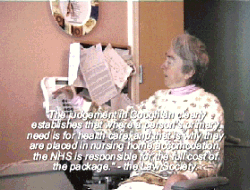Coughlan Advice for Solicitors
- and those considering use of a solicitor,
or preparing their own legal submission
updated 0900 Saturday 27th March 2010
from Robin ...
 Most of these words are unchanged since
I set up this page in June 2005. I discovered that experienced solicitors were seeking legal
advice from those associated with www.nhscare.info - not only from Derek Cole.
This page now includes some detailed free legal advice and it
was always my hope that
the page might eventually include the contact details of law firms or insurance companies whom I would
reccomend to make "no win no fee" claims on behalf of families.
Most of these words are unchanged since
I set up this page in June 2005. I discovered that experienced solicitors were seeking legal
advice from those associated with www.nhscare.info - not only from Derek Cole.
This page now includes some detailed free legal advice and it
was always my hope that
the page might eventually include the contact details of law firms or insurance companies whom I would
reccomend to make "no win no fee" claims on behalf of families.
In recent years I have been in contact with many of the few hundred families who have fought their
"Coughlan" cases, helped by people like Derek Cole and Steve Squires, and/or well known law firms
operating in the field of NHS Continuing Care.
I have spoken to both clients who were pleased with the service they received from their solicitors,
and to those who were less so.
I heard of cases where solicitors had taken large sums of money off families only to tell them later that
they were "not qualified" to handle a Coughlan claim, and could not therefore continue with the case.
My hope has been that, with time, far more solicitors will feel sufficiently confident to take on such
cases, and do so with success. Maybe this page will help make it happen more quickly. One prominent
law firm has already won back over £8million for their clients, and in 2010, one of these was £250,000.
This can be seen on our
Press page.
Finally, and only if you have a sense of humour,
you may wish to visit Robin's
Jokes about Lawyers
page.
Robin Lovelock, Sunninghill. March 2010.
considering use of a solicitor ...
Many of us are capable of writing letters, such as those on nhscare.info, but the
recipient may take more notice if it has the letterhead of a law firm. It does no harm
to be familiar with the work required, before you engage the services of any tradesman.
It may help you ask the right questions to determine if they have relevant
experience, and decide if their payment terms represent "value for money".
If and when you do engage the services of a solicitor, you may find yourself
working closely with them, reviewing the details of their next draft letter.
comparison of patient's condition with that of Pam Coughlan ...

One strategy adopted with success by legally unqualified people like Steve Squires, who won
his case with the Ombudsman, was to compare the patient's medical condition with that of Pamela Coughlan
at the time of her winning the appeal court case.
Watch the three minute
video of Pam Coughlan,
then ask yourself if the patient needs less care than Pam.
The above video is 5MB. A DVD-quality version of 150MB is available for solicitors and journalists.
It is hoped that this video of Pam Coughlan might also be useful as evidence for some cases.
Pam kindly provided these words in July 2005, describing her medical condition at that time, for use here:
"Robin- page 2 paragraph 3 of the introduction to the judgment of the court
of appeal 1999--
Miss Coughlan was grievously injured in a road traffic accident in 1971. She is tetraplegic; doubly incontinent, requiring regular catheterisation; partially paralysed in the respiratory tract, with consequent difficulty in breathing; and subject not only to the attendant problems of immobility but to recurrent headaches caused by an associated neurological condition.
--with best wishes Pam"
I believe all the cases brought to our attention have patients with more severe conditions than these.
We are all grateful to Pamela Coughlan, who at great effort and expense, paved the way over many years
in fighting her case, leading eventually to the Appeal Court decision in 1999 now known simply as "Coughlan".
I'm grateful to Steve Squires and Pam for permission to provide
these signed documents here:
PAMSDAY.PDF* describes Pam's condition in terms of care provided,
and
DADSDAY.PDF which describes that of Steve's late father. This is the type
of comparison that may be used as evidence. i.e. produce a similar page for the patient, ideally
signed by a GP, and include this with the PAMSDAY.
* better copy uploaded on 5th March 2007.
typical legal submissions ...
You may read a typical legal submission by Derek Cole
here. This sanitized text is for a case won in 2005.
You may wish to read read
Ian Perkin's legal submission
which resulted in Continuing Care for his mother in 2006.
"No Win No Fee" and the Law Society
Robin is grateful to the work of the Law Society for their clear advice to the Governement
including that quoted in red on our front page. They have
information on their web site including a standard template for "No Win No Fee" agreements
which
has been adopted by some reputable law firms. This template is for "conditional fee agreements" (CFA).
and may be seen
here
. Background on "costs" can be seen
here.
full text of the Coughlan Appeal Court judgement ...
These copies of the Coughlan Appeal Court judgement should all be of identical content
and are thought to be ©Crown Copyright.
Pam Coughlan first directed me to the copy of the full Coughlan judgement
here
- which is on www.bailii.org, the website of the British and Irish Legal Information Institute. I'm sure
this is an accurate copy.
You may also access a copy hosted on this site
here
should the bailii.org link above fail. This copy was emailed to Derek.
I'm grateful to Lesley Cozens for emailing me this URL of a Government source for this same
Coughlan Judgement which is:
www.hmcourts-service.gov.uk/judgmentsfiles/j282/coughlan.htm
It is now also hosted on this site (and any CD or DVD copy)
here.
The Grogan Judgement is
here.
This more recent case is often used to support "Coughlan" claims.
The Health Ombudsman's reports may be found
here.
extracts from www.nhscare.info relevant to lawyers ...
The front page of www.nhscare.info includes this, under the heading "simple advice for solicitors":
"The judgment in Coughlan clearly establishes that where a person's primary need is for health care, and that is why they are placed in nursing home accommodation, the NHS is responsible for the full cost of the package. "
- from the
summary
of the Law Society's Evidence to the House of Commons Health Committee Inquiry into NHS Continuing Care.
The full document is
here.
The
overview
page of www.nhscare.info has included this, under the heading "The Law" since February 2003:
Since the 1948 Health Act, the NHS must pay for all our nursing
needs from cradle to grave. Since 1999 those who were conned into
paying for their nursing home care may claim back the money under Coughlan - the
case of Pamela Coughlan, costing some £1.2 million to fight, which
was won in the Appeal Court. The Ombudsman has suggested a "trawl back"
to 1996 for those who were charged for their own care unlawfully.
This probably amounts to some £10 billion
owed by the NHS to families who paid the nursing home costs.
and this, under the heading "the Lawyers" :
Large successful law firms like Bevan Brittan (formerly Bevan Ashford),
who defended the NHS in the Coughlan case and lost, and have defended
the NHS on Coughlan-related cases and lost, will happily continue to defend the NHS
on these cases and lose: they are paid for their time by their client - not on results.
Strange as it may seem, it is in the business interest of law firms defending the NHS for
large numbers of families to have their cases fought and won. The cases are lost
- but they still get paid. It also makes "business sense" for the NHS to continue fighting
each case: delays in the case being won means delays in their paying back that huge backlog
of claims - and more medical records are destroyed. Now let us look at the business opportunities
for other reputable businesses who offer "no win no fee" services. Their costs, fees and profits
will depend on many things, including who else enters this business to compete with them, and how
many years it takes for the Government to recognize it will cost the taxpayer less for the NHS to
stop fighting cases, and set up a faster means of families claiming the money - but don't hold your
breath. "No Win No Fee Coughlan business" might be worth £billions over several years
- if they charged 10% of money claimed back on a "no win no fee" basis.
the case of Trevor Saunders ...
Trevor has had the benifit of expert legal advice from soon after his stroke in September 2006,
but details were not made public here until October 2008. In April 2008 details of his case were discussed
with the prominent law firm eventually chosen to handle his case to obtain Continuing Care from the NHS.
This law firm is experienced in this type of work and include a suitable "no win no fee" arrangement
if the case needs to continue through to and including Judicial Review. A different law firm, with
experience in dealing with local government, is also providing advice.
The names of these law firms have not been made public on www.nhscare.info for several reasons. These
reasons include greater freedom in reporting relevant events on Trevor's case pages quickly, without
the need to agree each change in detail. Use of these particular law firms do not, at this time, signify
a public reccomendation or endorsement by myself, or those associated with the NHSCare.info Campaign.
These firms do, of course, consider the details within their letters, written to support their clients,
to be confidential. They obviously also have a vested business interest to keep the details of letters,
based sometimes on years of experience, unavailable to other law firms considering "Coughlan" type business.
The receipients of these letters, such as NHS or Social Services staff, will know who these law firms are.
The case of Trevor Saunders has been public on www.nhscare.info since April 2008 and details are
here.
 Most of these words are unchanged since
I set up this page in June 2005. I discovered that experienced solicitors were seeking legal
advice from those associated with www.nhscare.info - not only from Derek Cole.
This page now includes some detailed free legal advice and it
was always my hope that
the page might eventually include the contact details of law firms or insurance companies whom I would
reccomend to make "no win no fee" claims on behalf of families.
Most of these words are unchanged since
I set up this page in June 2005. I discovered that experienced solicitors were seeking legal
advice from those associated with www.nhscare.info - not only from Derek Cole.
This page now includes some detailed free legal advice and it
was always my hope that
the page might eventually include the contact details of law firms or insurance companies whom I would
reccomend to make "no win no fee" claims on behalf of families.
